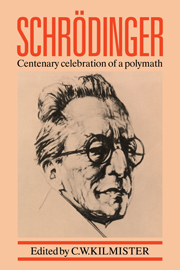Book contents
- Frontmatter
- Contents
- List of contributors
- Preface
- 1 Introduction
- 2 Boltzmann's influence on Schrödinger
- 3 Schrödinger's original interpretation of the Schrödinger equation: a rescue attempt
- 4 Are there quantum jumps?
- 5 Square root of minus one, complex phases and Erwin Schrödinger
- 6 Consequences of the Schrödinger equation for atomic and molecular physics
- 7 Molecular dynamics: from H+H2 to biomolecules
- 8 Orbital presentation of chemical reactions
- 9 Quantum chemistry
- 10 Eamon de Valera, Erwin Schrödinger and the Dublin Institute
- 11 Do bosons condense?
- 12 Schrödinger's nonlinear optics
- 13 Schrödinger's unified field theory seen 40 years later
- 14 The Schrödinger equation of the Universe
- 15 Overview of particle physics
- 16 Gauge fields, topological defects and cosmology
- 17 Quantum theory and astronomy
- 18 Schrödinger's contributions to chemistry and biology
- 19 Erwin Schrödinger's What is Life? and molecular biology
- Index
1 - Introduction
Published online by Cambridge University Press: 19 January 2010
- Frontmatter
- Contents
- List of contributors
- Preface
- 1 Introduction
- 2 Boltzmann's influence on Schrödinger
- 3 Schrödinger's original interpretation of the Schrödinger equation: a rescue attempt
- 4 Are there quantum jumps?
- 5 Square root of minus one, complex phases and Erwin Schrödinger
- 6 Consequences of the Schrödinger equation for atomic and molecular physics
- 7 Molecular dynamics: from H+H2 to biomolecules
- 8 Orbital presentation of chemical reactions
- 9 Quantum chemistry
- 10 Eamon de Valera, Erwin Schrödinger and the Dublin Institute
- 11 Do bosons condense?
- 12 Schrödinger's nonlinear optics
- 13 Schrödinger's unified field theory seen 40 years later
- 14 The Schrödinger equation of the Universe
- 15 Overview of particle physics
- 16 Gauge fields, topological defects and cosmology
- 17 Quantum theory and astronomy
- 18 Schrödinger's contributions to chemistry and biology
- 19 Erwin Schrödinger's What is Life? and molecular biology
- Index
Summary
This book describes the many aspects of the life and scientific work of Erwin Schrödinger, who, perhaps more than anyone else, serves to represent the whole of modern physics. The contributions to the book are from many hands, and so it seemed useful to me to precede them with a short note giving an uncontroversial account of his life which will serve as a framework into which they can be fitted. Such a collection as this still leaves out many aspects of Schrödinger's thought, for it considers his philosophy only in passing, his poetry not at all and ignores his wide and deep interest in sculpture and painting and in the classics.
Schrödinger was born in Vienna on August 12, 1887, and entered the University there to read physics in 1906. He worked there as an assistant from 1910 till his war service, and again after the war. Some short term appointments at Jena, Stuttgart and Breslau led up to his appointment to the chair of theoretical physics in Zürich in 1921. He was already treating a wide range of topics, but concentrating on atomic theory, for the old quantum theory had now entered on its heroic phase of final collapse. His six papers founding wave mechanics came at the end of his Zürich years, and in 1927 he went to the chair in Berlin, to remain there till the advent of Hitler in 1933.
- Type
- Chapter
- Information
- SchrödingerCentenary Celebration of a Polymath, pp. 1 - 3Publisher: Cambridge University PressPrint publication year: 1987
- 2
- Cited by



